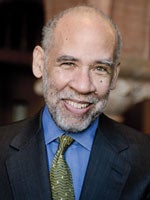John Payton ’77, a leading civil rights lawyer who defended the University of Michigan’s affirmative action policy before the Supreme Court and led the NAACP Legal Defense and Educational Fund, died March 22, 2012. He was 65.
In a statement, President Obama called Mr. Payton “a true champion of equality” who will be remembered for his “courage and fierce opposition to discrimination in all its forms.”
Named one of the decade’s most influential lawyers by the National Law Journal in 2010, Payton devised successful strategies in two of the most difficult affirmative action cases of our time: Gratz v. Bollinger and Grutter v. Bollinger. In the latter, the Supreme Court upheld race-conscious admissions in higher education. While at the Legal Defense and Educational Fund in 2010, Payton argued Lewis vs. City of Chicago, in which the Supreme Court unanimously concluded that black recruits for firefighting positions had filed a timely charge of discrimination against the city.
Payton’s five-decade career was devoted to the protection of minorities. He had been active in the civil rights movement since his days at Pomona College in the 1960s. At the time of his death, Payton was president and director-counsel of the NAACP Legal Defense and Education Fund, a civil rights legal organization, where he served since 2008.
In a 2011 profile that appeared in the Harvard Law Bulletin, Payton credited the social movements of his youth with sparking his passion for civil rights. “I concluded—and I think a lot of people who went to law school with me concluded—that if you really wanted to be a change agent for social justice, being a lawyer was probably the best platform to have,” said Payton.
Dean Martha Minow said: “John Payton meant the world to so many in the world—as a superb lawyer, as an involved citizen, and as a mentor and friend to generations of lawyers and activists who sought to remedy injustice. As was said of Robert Kennedy, he saw wrong and tried to right it. In the course of doing so, he shared of himself and taught so much to others. I and the entire the Harvard Law School community feel deeply this sudden loss of a great alumnus, friend and leader who exemplified the very best of what we try to teach and learn here and hope to cherish and honor his memory as we push ahead in preparing leaders who can walk in his steps.”
In a March 25 posting on The Root, Harvard Law Professor Charles Ogletree ’78 recounted the life and legacy of the late civil rights lawyer, whom he first met at Harvard Law in 1975. Describing Payton as “like a big brother to me,” Ogletree wrote: “Your stoic focus on the clients before us, and the goal of ending apartheid in South Africa, was a constant reminder of not only your great lawyering skills, but also your commitment to the larger sense of justice guiding our work. While you focused on the law and Constitution like a laser beam, you also took the time to make sure that those of us around you not only understood our part, but also developed skills that we could pass on to others as well.”
After receiving a bachelor’s degree in mathematics from Pomona College in 1973, and a J.D. from Harvard in 1977, Payton clerked for a year for Judge Cecil F. Poole of the U.S. Court of Appeals for the 9th Circuit. He later joined the Washington firm of Wilmer Cutler Pickering Hale & Dorr, where he did pro bono work for the NAACP in Mississippi. He worked on the 1982 NAACP v. Claiborne Hardware Co. case that supported the NAACP’s constitutional right to boycott businesses run by white merchants.
Payton was named partner at WilmerHale, but took a leave in the early 1990s to become corporate counsel for the District of Columbia, where he oversaw cases involving the District and prosecuted juvenile criminal cases and adult misdemeanor cases. In 1993, he was nominated by President Clinton to be assistant attorney general for civil rights, but withdrew his name after many members of the Congressional Black Caucus opposed the nomination.
After serving as an election monitor in South Africa in 1994, he returned to WilmerHale, where he specialized in corporate law. In 2008, he was named director-counsel and president of the NAACP Legal Defense and Educational Fund.
In a tribute on The Root, David Wilkins, the Lester Kissel Professor of Law and vice dean for Global Initiatives on the Legal Profession at Harvard Law School, wrote: “By pushing to open the doors of the still virtually all-white corporate world, while at the same time mobilizing the resources of his firm to provide pro bono support to traditional civil rights organizations in a host of important cases, John put the lie to the common myth that anyone who went to work for a large law firm was a ‘corporate tool’ who had ‘sold out’ his commitment to social justice. And when the call came to serve the cause of justice even more directly, whether in the D.C. government, South Africa or at the LDF, John never hesitated to answer the challenge.”
Survivors include Payton’s wife of more than 20 years, Gay McDougall, a noted civil rights attorney; two sisters, Janette Oliver and Susan Grissom; and a brother, Glenn Spears.
[This obituary was compiled from excerpts which appeared in The New York Times, The Los Angeles Times, The Washington Post and The Root.]
